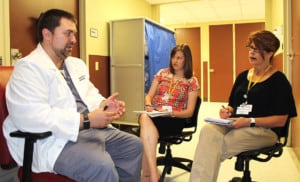
Camden Coalition representatives meet with Justin Griner, inpatient pharmacist at Regional One Health, to discuss ONE Health.
Within health care, there is a patient population who utilizes high-cost services, like emergency department care, more than others. These “high utilizers” often lack social resources or find themselves with economic, education, addiction or housing issues that exacerbate their health.
It’s time for ONE Health in Memphis, an opportunity to use compassionate care and exceptional services to keep our most vulnerable residents healthier. This new concept in care is a partnership between Regional One Health and Camden Coalition.
A Camden Coalition team visited Memphis this week to begin a process that over the next several months will focus on analyzing every piece of data to better understand the patients and possible trends related to the circumstances that have them in need of care.
“We have to come up with solutions,” said Susan Cooper, Chief Integration Officer, Senior Vice President, Ambulatory Services for Regional One Health. “They have to be tailored to people we care for and that’s where Camden Coalition comes in. We have to start somewhere, and that’s here at Regional One Health. But we’re also looking to community partners to come alongside us.”
ONE Health is a partnership between Regional One Health and Camden Coalition, funded in part by the Assisi Foundation of Memphis. Together, Regional One Health and Camden Coalition want to understand the underlying reasons people in the community become patients, and what can be done to reduce or remove those reasons.
“One of our core principles is we’re not here to sell a model,” said Lauran Hardin, Senior Director of Education & Curriculum at Camden Coalition. “We’re here to share resources that will help, but there is an abundance of resources here in Memphis. In this work the most important thing is everyone in the community and how they’re connected. We’re not reinventing the wheel. It’s bringing together everyone’s expertise.”
The next steps are data analysis, asset mapping and co-design. We want to understand the population and opportunity and then better understand the strengths in the organization and the possibilities for partnership in the community. Finally, as we’re informed by data and asset mapping we want to answer “What is the problem we are trying to solve?”
For much more about ONE Health, visit our new ONE Health website and sign up to receive updates as the project progresses.